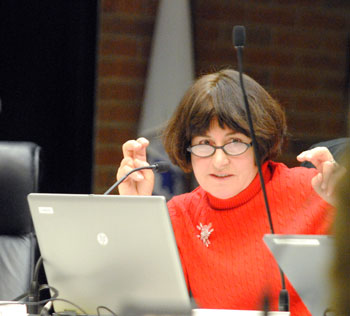Positions Open: New Transit Authority Board
Articles of incorporation for a new Act 196 transit authority, called The Washtenaw Ride, were filed with the state last week, on Oct. 3, 2012. The Ann Arbor Transportation Authority had hoped the new authority’s board would convene on Oct. 11, but that meeting was cancelled because key appointments to that board have not yet been made.

Simultaneous service on the 15-member Washtenaw Ride (Act 196) board and the seven-member AATA board generated legal questions. (Illustration by The Chronicle.)
It was previously assumed that the seven Ann Arbor appointments to the new authority’s 15-member board would serve simultaneously on AATA’s board. Now, it appears that different appointments will be made.
Responding to an emailed query from The Chronicle, Ann Arbor mayor John Hieftje wrote late Friday afternoon: “On Monday night [at the council's Oct. 15 meeting] I will put out a call for applications to serve on the 196 Board. I will not be appointing anyone to that board who would also sit on the AATA Board.”
An application for all city boards and commissions is available on the city clerk’s website.
An informal 15-member group has been meeting as the board of the unincorporated authority for around a year. Some members of the AATA board and many others had assumed that upon incorporation, the informal group would become automatically installed as the board of the new Act 196 authority. However, that won’t be the case. Ann Arbor’s seven representatives to the new authority’s board first need to be nominated by the mayor and confirmed by the city council – under terms of a four-party agreement ratified between the cities of Ann Arbor and Ypsilanti, Washtenaw County and the AATA.
More significantly, according to several sources, the apparent current view of the Ann Arbor city attorney’s office is that service on the AATA board is not legally compatible with simultaneous service on the board of the new transit authority. So appointing seven Ann Arbor members to the new authority’s board would require nominating seven individuals who are different from those who might continue to serve on the seven-member AATA board.
Another issue apparently identified by the city attorney’s office is the fact that Act 196 of 1986 refers to an additional 30-day window for a jurisdiction in the county to opt out of inclusion in the new transit authority – a window that has not yet opened. Letters of notification sent by the AATA in late September to all jurisdictions in the county referred to a statutory 30-day window starting with the filing of the articles of incorporation. But Act 196 also requires that the new transit authority itself notify jurisdictions, which also triggers a 30-day window for opting out. The statute makes clear that it’s the later of the two windows that is relevant. Because the new transit authority does not yet have a seated board, it has not yet acted to notify jurisdictions countywide.
In any case, some jurisdictions have already opted out of the new Act 196 authority. The Northfield Township clerk’s office responded to a Chronicle phone query with confirmation that on Oct. 9, the township board decided to withdraw from the new authority on a 4-0 vote. The Chronicle has as-yet-unconfirmed reports that the boards of Salem Township and Manchester Township have also voted to opt out.
Another wrinkle: The change in composition of the Ann Arbor city council after the Nov. 6 election. Councilmember Stephen Kunselman (Ward 3) has told The Chronicle that he would like to pursue the possibility of Ann Arbor opting out – and he thinks there might be six votes on the new council to accomplish that. If Ann Arbor opted out, it would effectively end the initiative. [Full Story]




